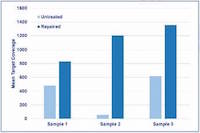Channels
Special Offers & Promotions
OGT Enhances NGS Results from FFPE Samples
New SureSeq™ FFPE DNA Repair Mix delivers excellent sequencing data for confident variant calling from minimal DNA input
 Oxford Gene Technology (OGT), The Molecular Genetics Company, has introduced its SureSeq™ FFPE DNA Repair Mix — optimised to repair a broad range of damage in formalin-fixed, paraffin-embedded (FFPE) derived DNA. The mix effectively repairs DNA damage, improving library yields, on-target rates and mean target coverage, while removing fixation and storage artefacts and reducing the amount of starting material required.
Oxford Gene Technology (OGT), The Molecular Genetics Company, has introduced its SureSeq™ FFPE DNA Repair Mix — optimised to repair a broad range of damage in formalin-fixed, paraffin-embedded (FFPE) derived DNA. The mix effectively repairs DNA damage, improving library yields, on-target rates and mean target coverage, while removing fixation and storage artefacts and reducing the amount of starting material required.
Having sufficient quality and quantity of FFPE samples for sequencing is a common problem in clinical research. Fixation processes significantly damage nucleic acids and long storage times can produce problematic artefacts. In addition, many FFPE samples are often irreplaceable and there is a real need to reduce DNA input for NGS. Consequently low-starting material amplicon-based NGS methods are frequently favoured, however, resulting PCR bias and lower complexity from smaller inputs mean these methods are not well suited to detect low-frequency mutations in heterogeneous tumour samples. Hybridisation-based approaches on the other hand eliminate PCR bias — providing much more reliable data — but require higher DNA inputs.
Available with OGT’s SureSeq panels, the FFPE DNA Repair Mix increases success and accuracy of hybridisation-based NGS for FFPE samples by repairing damage such as nicks and gaps, oxidised bases, blocked 3’ ends and deamination of cytosine to uracil. Repairing the damage in this way enables a reduction of the amount of required starting material down to as little as 100 ng while delivering excellent sequencing data for the utmost confidence in variant calling.
The new SureSeq FFPE DNA Repair Mix highlights OGT’s strong commitment to continuous optimisation of its products and workflows. This commitment is further demonstrated in a recent application note on the use of enzymatic DNA digestion rather than mechanical shearing when preparing DNA samples for NGS. Enzymatic digestion was found to offer a more streamlined protocol saving up to two hours of time while lowering the amount of input DNA required and removing the requirement for expensive mechanical shearing equipment.
David Cook, Senior Product Manager at OGT commented, ‘We’re very excited about the new SureSeq FFPE DNA Repair Mix — it’s going to make a big difference to anybody sequencing from FFPE samples. Products like this and the vast amount of research OGT undertakes on product and workflow optimisation demonstrates our commitment to delivering the best, most innovative tools to our customers’.
more about oxford gene technology
more news from oxford gene technology
Media Partners


